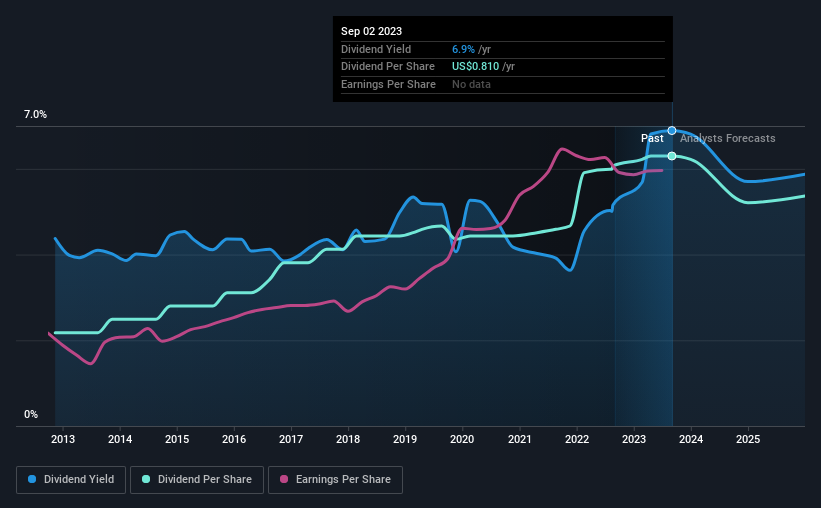United Bancorp (NASDAQ:UBCP) Could Be A Buy For Its Upcoming Dividend
United Bancorp, Inc. (NASDAQ:UBCP) stock is about to trade ex-dividend in four days. The ex-dividend date is usually set to be one business day before the record date which is the cut-off date on which you must be present on the company's books as a shareholder in order to receive the dividend. The ex-dividend date is of consequence because whenever a stock is bought or sold, the trade takes at least two business day to settle. Meaning, you will need to purchase United Bancorp's shares before the 7th of September to receive the dividend, which will be paid on the 20th of September.
The company's next dividend payment will be US$0.17 per share, and in the last 12 months, the company paid a total of US$0.81 per share. Based on the last year's worth of payments, United Bancorp stock has a trailing yield of around 6.9% on the current share price of $11.75. If you buy this business for its dividend, you should have an idea of whether United Bancorp's dividend is reliable and sustainable. So we need to investigate whether United Bancorp can afford its dividend, and if the dividend could grow.
Check out our latest analysis for United Bancorp
Dividends are typically paid from company earnings. If a company pays more in dividends than it earned in profit, then the dividend could be unsustainable. That's why it's good to see United Bancorp paying out a modest 42% of its earnings.
Companies that pay out less in dividends than they earn in profits generally have more sustainable dividends. The lower the payout ratio, the more wiggle room the business has before it could be forced to cut the dividend.
Click here to see how much of its profit United Bancorp paid out over the last 12 months.
Have Earnings And Dividends Been Growing?
Stocks in companies that generate sustainable earnings growth often make the best dividend prospects, as it is easier to lift the dividend when earnings are rising. If business enters a downturn and the dividend is cut, the company could see its value fall precipitously. Fortunately for readers, United Bancorp's earnings per share have been growing at 16% a year for the past five years.
Another key way to measure a company's dividend prospects is by measuring its historical rate of dividend growth. Since the start of our data, 10 years ago, United Bancorp has lifted its dividend by approximately 11% a year on average. It's exciting to see that both earnings and dividends per share have grown rapidly over the past few years.
The Bottom Line
From a dividend perspective, should investors buy or avoid United Bancorp? Companies like United Bancorp that are growing rapidly and paying out a low fraction of earnings, are usually reinvesting heavily in their business. This strategy can add significant value to shareholders over the long term - as long as it's done without issuing too many new shares. Overall, United Bancorp looks like a promising dividend stock in this analysis, and we think it would be worth investigating further.
While it's tempting to invest in United Bancorp for the dividends alone, you should always be mindful of the risks involved. Our analysis shows 2 warning signs for United Bancorp and you should be aware of them before buying any shares.
If you're in the market for strong dividend payers, we recommend checking our selection of top dividend stocks.
Have feedback on this article? Concerned about the content? Get in touch with us directly. Alternatively, email editorial-team (at) simplywallst.com.
This article by Simply Wall St is general in nature. We provide commentary based on historical data and analyst forecasts only using an unbiased methodology and our articles are not intended to be financial advice. It does not constitute a recommendation to buy or sell any stock, and does not take account of your objectives, or your financial situation. We aim to bring you long-term focused analysis driven by fundamental data. Note that our analysis may not factor in the latest price-sensitive company announcements or qualitative material. Simply Wall St has no position in any stocks mentioned.

